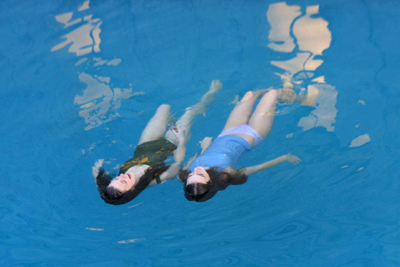
Reviews of Recent Independent, Foreign, & Documentary Films
in Theaters and DVD/Home Video

THE HOLY GIRL
Directed & Written by: Lucrecia Martel.
Produced by: Lita Stantic.
Director of Photography: Felix Monti.
Edited by: Santiago Ricci.
Music by: Andres Gerszenzon.
Released by: HBO/Fine Line.
Language: Spanish with English subtitles.
Country of Origin: Argentina/Italy/Netherlands/Spain. 106 min. Rated: R.
With: Mercedes Morán, Carlos Belloso, Alejandro Urdapilleta, Maria Alché, Julieta Zylberberg & Mia Maestro.
In provincial Argentina, teenager Amalia (Maria Alché) and her friends try
to figure out the "mission" God has given them. One day as she's
watching a street musician, Amelia feels
a man sexually rubbing himself against her. He is Dr. Jano (Carlos Belloso), a married man
staying at her family's hotel for a medical convention, and who will also
show an interest in her mother. Although she hardly knows him, Amalia decides this encounter is
her sign
from God. Her mission is to save this man. And from here onwards, the film
tries to weave together the message that sometimes by wanting to do good,
one only does evil. Yet it is sometimes too contrived, too vague, too much
and too little. Amalia's mission is never fully explained. As she follows
him furtively around the hotel, it seems more like a crush than a holy
mission. Perhaps this was the director's aim; if so, it lacks force and
feels like a lot has been edited out.
However, the scenes where Amalia and her friends interpret dogma are
hilarious because of their rigid interpretations. In another, her best
friend Josefina (Julieta Zylberberg) tells a boy she is making out with that she doesn't want
to engage in premarital sex, but then proceeds to allow him to have anal sex
with her instead. It effectively emphasizes how dogmatic the Catholic
teachings about abstinence can be, and sometimes how they breed absurd
consequences. When not encouraged to think, but to accept literally, then anything outside the
literal meaning can be conceived as
permissible.
With thick glasses and expressionless eyes, Dr. Jano, physically the cliché
of the predatory man, is generally well portrayed as a complex, not
completely immoral man. And Amalia's mother Helena, played by Mercedes
Morán, is a strong character, whose inner turmoil and regrets are vividly
felt. Her relationship with her brother and the many people working in the
hotel are realistic and
poignant.
All in all, though, these scenes cannot wholly save the film from lacking a
compass and a meandering pace. Though some parts are well developed and many
secondary characters three-dimensional and powerful, the overall journey
doesn't have definition, and the ending is not only guessed at well in
advance, but falls into the trap of wanting to be subtle and ends up being
off course. Like director Lucrecia Martel's previous film La Ciénaga,
she depicts an insular world, leaving the viewer on the outside. Roxana M. Ramirez
April 29, 2005
HomeAbout
Film-Forward.com Archive of Previous
Reviews
|